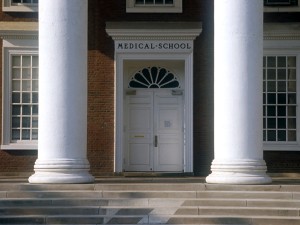Education
EDUCATION: General Medicine, Geriatrics and Palliative Care
The Division of General Medicine, Geriatrics and Palliative Care is the bedrock of education for the Department of Medicine. Almost all faculty members are engaged in teaching at the undergraduate and graduate level, and provide extensive education for trainees from other departments as well, including Emergency Medicine, Family Medicine, Psychiatry, and Surgery.
 At the undergraduate level, Jennifer Marks serves as one of two course directors for the recently established “Clinical Skills Development” course, and Evan Heald directs the popular Ambulatory Internal Medicine (AIM) clerkship, which consistently receives top ratings in the Mulholland Clerkship Report (a program evaluation submitted each year by the medical school’s graduating class). Mohan Nadkarni developed and teaches a course for first-year medical students, “Social Issues in Medicine,” which aims to nurture a humanistic perspective and sense of professionalism in students. Huai Cheng leads the required one-month geriatric rotation for third-year medical students. Other faculty serve as “thread” leaders, liaisons with course leaders in the medical school’s “NexGen” curriculum; among other responsibilities, they help establish goals and learning objectives and develop content for student training in internal medicine.
At the undergraduate level, Jennifer Marks serves as one of two course directors for the recently established “Clinical Skills Development” course, and Evan Heald directs the popular Ambulatory Internal Medicine (AIM) clerkship, which consistently receives top ratings in the Mulholland Clerkship Report (a program evaluation submitted each year by the medical school’s graduating class). Mohan Nadkarni developed and teaches a course for first-year medical students, “Social Issues in Medicine,” which aims to nurture a humanistic perspective and sense of professionalism in students. Huai Cheng leads the required one-month geriatric rotation for third-year medical students. Other faculty serve as “thread” leaders, liaisons with course leaders in the medical school’s “NexGen” curriculum; among other responsibilities, they help establish goals and learning objectives and develop content for student training in internal medicine.
In graduate medical education, division faculty are at the forefront of designing innovative curricula for internal medicine residency programs that reflect their deep involvement in reassessing, improving, and advancing systems-based practice for the care of underserved patients and treatment of chronic illness. The division runs the ambulatory curriculum for the residency program, which covers evidence-based medicine, professionalism, patient safety, quality improvement, and communication. In addition, General Medicine’s University Medical Associates (UMA) provides a three-year continuity educational experience for the residency program. Brian Uthlaut serves as associate director of the internal medicine residency program, and Andrew Wolf as associate director of primary care residency. Notably, the primary care program has successfully recruited its full complement of three residents each year, despite a highly competitive environment. The geriatric fellowship, directed by Seki Balogun, and the palliative care fellowship, directed by Joshua Barclay, have each received a full five-year accreditation. Division faculty members also cover nearly half of the ward attending slots.
In the realm of continuing medical education, the division has been instrumental in developing programs focused on wellness and reflective practice. The Mindfulness Center has tripled its enrollment over the past two years and doubled its course offerings. The division’s Center for Appreciative Practice (CAP) launched Schwartz Center Rounds in 2012, which provides a forum for healthcare providers to discuss the social and emotional issues that arise in caring for patients. Another highlight for CAP in 2013 was the facilitation of a conference in the spring at Virginia Tech on “Contemplative Practices for a Technological Society”; CAP faculty led discussions on ways contemplative practice can support excellence and innovation in a variety of organizational settings. The center continues to offer workshops for UVA-affiliated healthcare providers on “Medical Error Disclosure and Peer Support,” part of its ongoing mission to enhance compassion and openness in the UVA Health System.
A “Conference on the History of African Americans in the Medical Professions” in Washington, DC, was chaired by Preston Reynolds in June 2013. Sponsored by UVA and hosted by the Cultural Program of the National Academy of Sciences, as well as the Institute of Medicine’s Roundtable on the Promotion of Health Equity and the Elimination of Health Disparities, the conference focused on the dissemination of information and resources for teachers to develop curricula on the contribution of African Americans to the healthcare professions.
A course on “Quality and Safety Leadership in Academic Medicine” (QSLAM), developed by John Voss and Margaret Plews-Ogan, was delivered to over 200 people in the UVA Health System in the past year, and will be offered as a CME course for non-UVA providers this fall.
